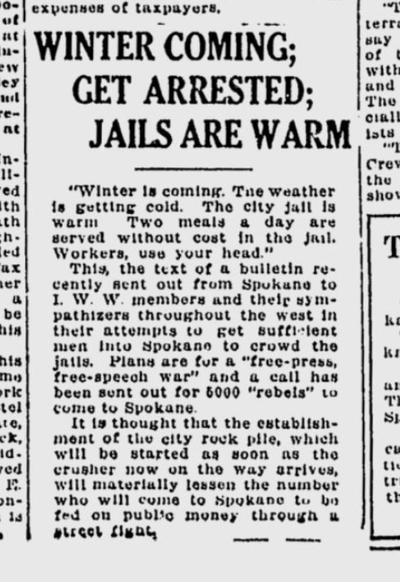100 years ago in Spokane: Alarmist Chronicle warns of ‘Wobbly’ plot to pack Spokane jails

The Spokane Daily Chronicle, ever alarmist when it came to the Wobblies, warned that the Industrial Workers of the World were plotting a new “free-speech war” in Spokane, 11 years after their famous 1909 Free Speech Fight. The idea, once again, was to jam Spokane jails full in a show of civil disobedience.
The paper said it had evidence of a Wobbly bulletin which read, “Winter is coming. The weather is getting cold. The city jail will be warm. Two meals a day are served without cost in the jail. Workers, use your head.”
This time, it was billed not just as a free-speech fight, but as a “free-press, free-speech war.” They wanted 5,000 people to crowd the jails. All of this was still in the realm or rumor.
The Chronicle remarked that the new “city rock pile” ought to “materially lessen the number who will come to Spokane to be fed on public money.”
From the murder beat: Members of the “Italian colony of the city” jammed the courtroom for the murder trial of Joe Masto, accused of shooting Vincent Chiedo.
Masto claimed that he and Chiedo had a long-running feud. It came to a head the day before Masto’s wedding, when he heard that Chiedo had gone to his bride’s father and accused Masto of being a “crook.” Masto confronted Chiedo at the Parkwater rail yards, where Chiedo worked, and got in a violent argument. A witness said he saw a struggle and then Masto jammed a gun into Chiedo’s side and fired.
Both were described as Italian laborers. Their names were rendered as “Masato” and “Cheida” in earlier accounts of the murder. The trial was just beginning, and jurors were selected. The case was attracting “wide spread attention” from the city’s Italian community, said the Chronicle.